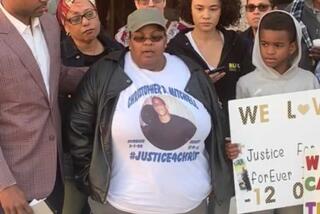Holds Police Have No Duty to Save Data Favorable to Suspect : Court Excuses Loss of Key Evidence
WASHINGTON — In a victory for law enforcement, the Supreme Court ruled Tuesday that the police have no duty either to conduct scientific tests at a crime scene or to preserve evidence even if this information could free a criminal defendant.
On a 6-3 vote, the high court said that a defendant’s right to a fair trial is not violated if police negligence or mistakes result in the loss of key evidence.
The ruling underscores the willingness of the high court’s conservative majority to give the police the benefit of the doubt in closely contested criminal cases. Five years ago, the justices said evidence that was obtained through an illegal search may be used at a trial if the police acted “in good faith.”
Must Not Act in Bad Faith
In this case, the court said that police are not required to furnish for a trial potentially exonerating evidence so long as they have not acted in “bad faith.”
The decision, in a sexual assault case from Arizona, could prove highly significant with the emergence of new, more precise tests in criminal investigations. For example, genetic testing of blood can show with near certainty whether a blood sample came from a suspect.
In most instances, police investigators would have every reason to perform the most up-to-date tests on a suspect’s blood, semen or fingerprints and to preserve this evidence. On some occasions, however, police investigators through laxness or ineptitude fail to do the proper tests or later lose the evidence.
This failure by the police to retain the evidence may not be used to win freedom for the defendant on the grounds that it might have proved his innocence, the high court said.
No Duty to Perform Tests
” . . . The police do not have a constitutional duty to perform any particular tests,” said Chief Justice William H. Rehnquist, who wrote the opinion. “We therefore hold that, unless a criminal defendant can show a bad faith on the part of the police, failure to preserve potentially useful evidence does not constitute a denial of due process of law.”
This ruling is a subtle departure from decisions dating back 25 years. Then, a more liberal Supreme Court focused on whether the evidence in question was crucial to the defendant’s case when deciding if his rights had been violated. If vital evidence was lost or withheld, the defendant could win a reversal of his conviction by arguing that he had not received the “due process of law” guaranteed by the Constitution.
Now, however, the more conservative court says that the key issue is not the importance of the evidence but whether the conduct of the police and prosecutors was justifiable.
Rape of 10-Year-Old Boy
This case stemmed from the abduction and rape of a 10-year-old Arizona boy by a middle-aged man in 1983. The boy was taken to a hospital, where a doctor, using a police-supplied “sexual assault kit,” tried unsuccessfully to get samples of the assailant’s blood, semen or hair that could be matched with a suspect. In addition, the police picked up the boy’s stained clothing but failed to refrigerate it to preserve the semen samples.
However, the boy did pick out a suspect, Larry Youngblood, from a police photograph, and he was subsequently convicted by a jury and sentenced to 10 years in prison. In his appeal, Youngblood contended that the missing semen tests would have proved his innocence. The Arizona Court of Appeals agreed and said that a conviction must be reversed when “the police permit the destruction of evidence” that could prove a man’s innocence.
The Supreme Court reversed this conclusion. Rehnquist’s opinion (Arizona vs. Youngblood, 86-1904) was joined by Justices Byron R. White, Sandra Day O’Connor, Antonin Scalia and Anthony M. Kennedy. Justice John Paul Stevens, a moderate, concurred in the judgment but refused to join Rehnquist’s sweeping opinion.
Court Liberals Dissent
The three court liberals dissented. “The Constitution requires that criminal defendants be provided with a fair trial, not merely a ‘good faith’ try at a fair trial,” Justice Harry A. Blackmun wrote. He was joined by Justices William J. Brennan Jr. and Thurgood Marshall.
In a second case, the high court affirmed the need for court-appointed attorneys. In an 8-1 ruling, the justices said that an Ohio court had erred by letting a court-appointed lawyer withdraw from representing a defendant who had “several arguable claims” to appeal his conviction. Rehnquist dissented in the case (Penson vs. Ohio, 87-6116).
More to Read
Sign up for Essential California
The most important California stories and recommendations in your inbox every morning.
You may occasionally receive promotional content from the Los Angeles Times.











